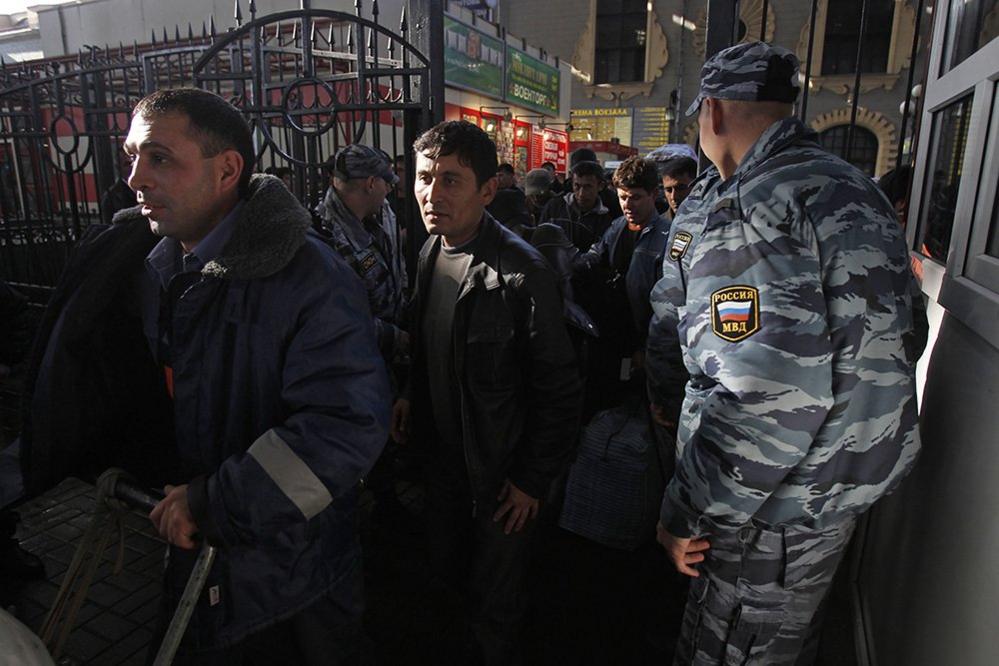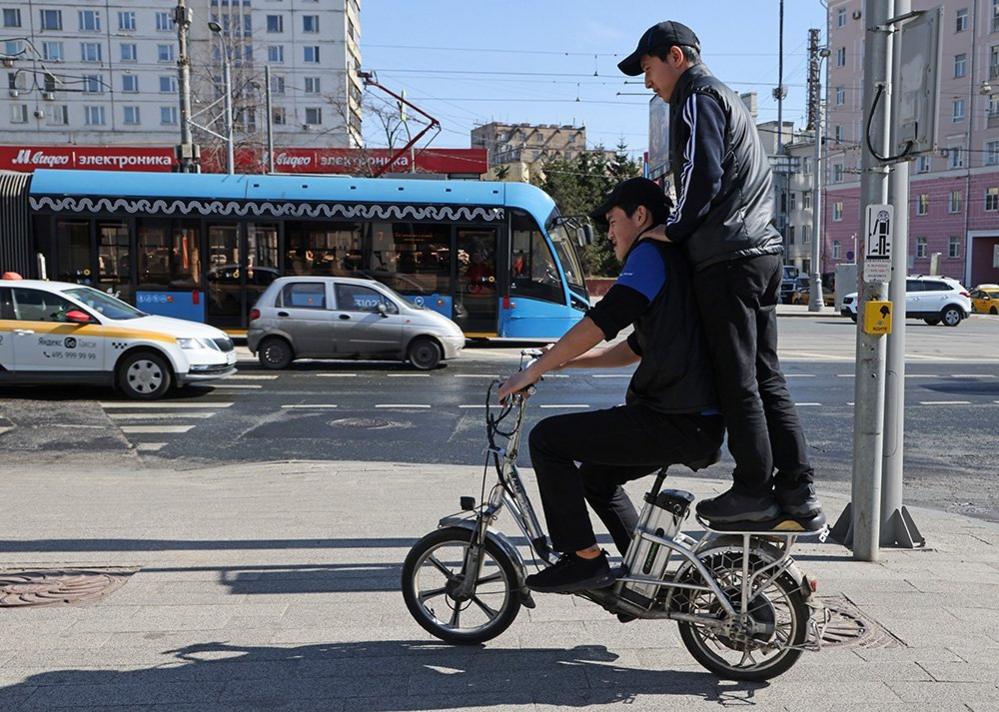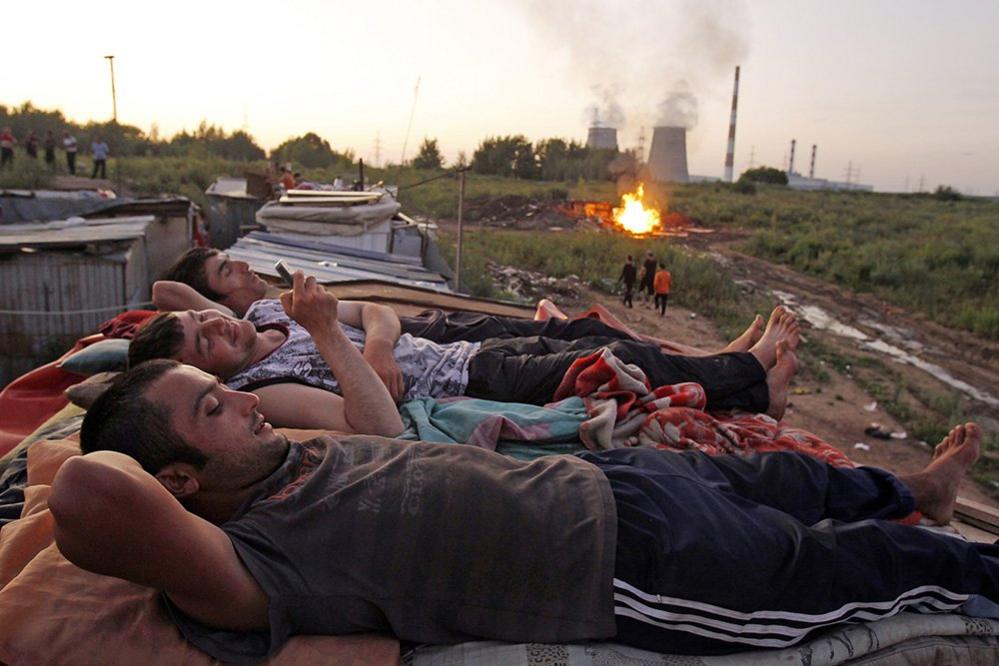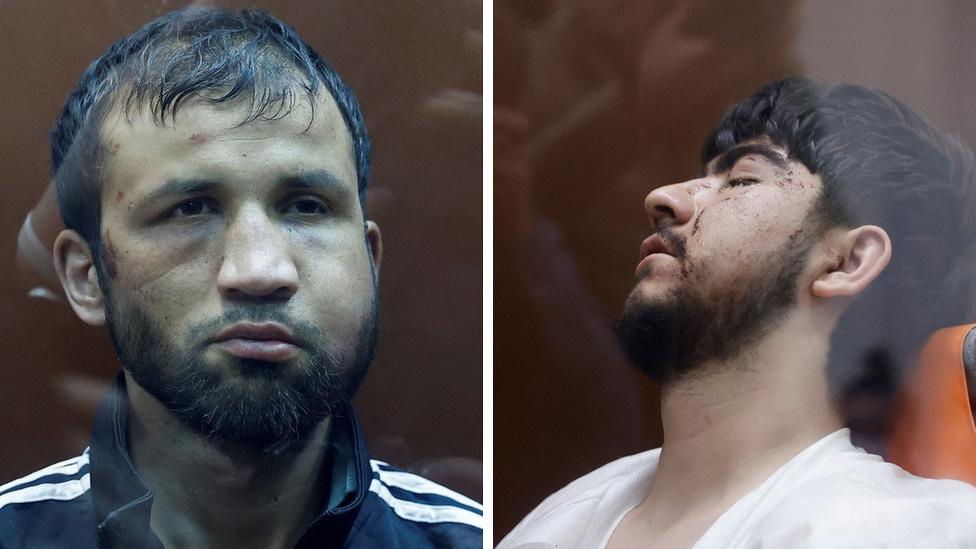Moscow attack: Central Asian migrants hit by backlash in Russia
- Published

Migrant workers from Central Asia have often faced discrimination in Russia (file pic)
An increase in beatings, vandalism and episodes of racism against Central Asian migrants has been reported in Russia since the deadly attacks at Moscow's Crocus City Hall last Friday.
Four Tajik nationals have been accused of killing 140 people in the attack, claimed by jihadist group Islamic State. Several other suspects have been arrested, all of Central Asian origin.
Forecasting a rise in tensions in the aftermath of the Moscow murders, the embassy of Tajikistan in Russia warned its citizens at the weekend not to leave their homes unless necessary.
Central Asian migrants make up a sizeable proportion of Russia's migrant labour population, particularly in the retail, transportation and construction sectors.
Many already experience high levels of discrimination. They are "often confronted with broad social xenophobia that sees them as something of an underclass," Prof Edward Lemon of Texas A&M University told the BBC.
Tajik-born singer Manizha Sanghin, who represented Russia at Eurovision in 2021, condemned the "flagrant atrocity" of the Moscow attack, but warned of the "consequences that will descend upon Tajiks and all residents of Central Asia". She is now a goodwill ambassador for the UN refugee agency.

Migrants from Kyrgyzstan, Uzbekistan and Tajikistan make up a significant part of Russia's migrant workforce
There are about 10.5 million migrants from Uzbekistan, Tajikistan and Kyrgyzstan working in Russia, according to the Russian Interior Ministry. Many more are potentially unregistered.
The high numbers are due to a visa-free regime with Russia which makes it one of the only options for Central Asian migrants looking for the economic opportunities they don't have at home, Prof Lemon explained.
Despite the Tajik embassy's warning, news that the Crocus City Hall attackers were Tajik nationals quickly travelled across Russia.
Over the weekend, a migrant-owned business was burnt down in the city of Blagoveshchensk in Russia's Far East, while several migrants were beaten up in Kaluga, a city south west of Moscow.
Migrants from Kyrgyzstan were held at Moscow's Sheremetyevo airport for two days and locked in a room without food or water only to be later returned home, while taxi drivers in Moscow reported being asked by clients to confirm that they were not Tajiks.
Within hours of the Crocus City Hall attack, messages on Telegram messaging group chats in the early hours of Saturday betrayed a growing nervousness among the migrant community in Russia.
"Many people already don't like non-Russians, and now we have this situation," one person wrote on a group entitled "Tajiks in Moscow".
Worried about the risk of a backlash on the Tajik community, another said: "Please, God, let [the attackers] be Ukrainian instead."
Valentina Chupik, a lawyer who works with migrants without charge, told Russian media outlet Mediazona she had received 2,500 reports of "acts of aggression" against migrants in the two days following the Moscow attack.
Police broke into migrants' dormitories and hostels across the country and detained several people. More than 30 cases of torture following the arrests were also reported, Ms Chupik said.
Four days on, the lawyer told the BBC that numbers were continuing to rise and several Tajiks had told her they were considering leaving Russia.
"A group of Tajik citizens asked me to provide them with safe accommodation because they are scared to live in their hostel," Ms Chupik said.

World Bank data shows around half of Tajikistan's GDP is from citizen remittances from abroad (file photo, Moscow 2011)
Ms Chupik says discrimination in Russia typically affects migrants "who do not have Slavic facial features", and "most of the humiliation and violence comes from Russian law enforcement rather than from ordinary people".
While Friday's attack in Moscow has exacerbated the situation, migrant communities have long been the targets of police crackdowns.
Every year, Russian authorities carry out large anti-migrant campaigns, launching dozens of raids on Central Asian businesses, mosques and places of gathering. Last year's campaign reportedly resulted in more than 15,000 migrants being deported.
In January, the Kyrgyz and Uzbek governments demanded that Russia investigate a social media video showing migrant workers being insulted and humiliated during a raid in Yekaterinburg.
And yet many Central Asian migrants often have little choice but to continue working in Russia. Tajikistan is the poorest country in Central Asia and half its gross domestic product (GDP) comes from remittances sent by relatives abroad.
That is why they still head for Russia "in spite of the many problems," Prof Lemon said.
And Russia's complex migration laws mean that even labourers who enter legally often end up staying without the required paperwork.
Life as an undocumented migrant means becoming more susceptible to abuse from employers, substandard living conditions and no access to healthcare.
It also means a greater risk of detention, which in turn leads to having to pay hefty bribes to authorities.
Soon after the Moscow attack, several Russian MPs called for the tightening of migrant laws. One suggested migrants should be expelled from Russia "for the slightest offence".
But there is no realistic chance of that happening as Russia benefits from Central Asian migrants too. The war in Ukraine has left Russia facing labour shortages and it would simply be unable to afford losing millions of workers.
But years of tensions and xenophobia mean migrant communities in Russia continue to feel nervous.
"Be careful, good people," one member of a Tajik Telegram group said. "After this, it will definitely be a difficult time for us brothers and sisters."
Additional reporting by Dilmurad Avalbaev in Tashkent.
Related topics
- Published25 March 2024
